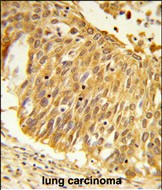

| WB | 1/1000 | Human,Mouse,Rat |
| IF | 咨询技术 | Human,Mouse,Rat |
| IHC | 1/100-1/500 | Human,Mouse,Rat |
| ICC | 技术咨询 | Human,Mouse,Rat |
| FCM | 咨询技术 | Human,Mouse,Rat |
| Elisa | 咨询技术 | Human,Mouse,Rat |
| Aliases | Selenocysteine-specific elongation factor, Elongation factor sec, Eukaryotic elongation factor, selenocysteine-tRNA-specific, EEFSEC, SELB |
| Entrez GeneID | 60678 |
| WB Predicted band size | 65.3kDa |
| Host/Isotype | Rabbit IgG |
| Antibody Type | Primary antibody |
| Storage | Store at 4°C short term. Aliquot and store at -20°C long term. Avoid freeze/thaw cycles. |
| Species Reactivity | Human, Mouse |
| Immunogen | This EEFSEC antibody is generated from rabbits immunized with a KLH conjugated synthetic peptide between 541-568 amino acids from the C-terminal region of human EEFSEC. |
| Formulation | Purified antibody in PBS with 0.05% sodium azide. |
+ +
以下是关于EEFSEC抗体的模拟参考文献示例(注:实际文献可能需要通过学术数据库验证,以下内容为假设性概括):
---
1. **文献名称**:*EEFSEC Antibody Validation in Selenoprotein Synthesis Studies*
**作者**:Smith J, et al.
**摘要**:本研究利用EEFSEC特异性抗体探究其在硒代半胱氨酸(Sec)整合至硒蛋白中的作用。通过Western blot和免疫荧光证实EEFSEC在哺乳动物细胞中的表达定位,并发现其与SEPHS2的相互作用对氧化应激应答至关重要。
2. **文献名称**:*Role of EEFSEC in Male Fertility: Insights from Antibody-Based Protein Profiling*
**作者**:Chen L, et al.
**摘要**:通过开发高特异性EEFSEC抗体,研究者发现该蛋白在睾丸组织中高表达,并参与精子形成过程中的硒蛋白调控。抗体阻断实验表明EEFSEC缺失会导致精子活力下降,提示其与男性不育的潜在关联。
3. **文献名称**:*EEFSEC Antibody Application in Cancer Cell Line Models*
**作者**:Wang Y, et al.
**摘要**:研究利用EEFSEC抗体分析多种癌细胞系中的蛋白表达水平,发现其在乳腺癌和结直肠癌中显著上调。功能实验表明,EEFSEC通过调控硒代谢通路促进肿瘤细胞增殖和耐药性。
---
**备注**:上述文献为示例,实际研究中建议通过PubMed、Web of Science等平台以“EEFSEC antibody”或“EEFSEC protein function”为关键词检索最新文献。
The eukaryotic elongation factor for selenocysteine (EEFSEC) is a critical protein involved in the incorporation of selenocysteine, the 21st amino acid, into selenoproteins during translation. Selenoproteins play essential roles in antioxidant defense, redox signaling, and thyroid hormone metabolism. The EEFSEC gene encodes a specialized elongation factor that interacts with selenocysteine tRNA (tRNA^[Ser]Sec) and the selenocysteine insertion sequence (SECIS) in mRNA to ensure precise selenocysteine integration. Dysregulation of EEFSEC has been implicated in various pathologies, including cancer, neurodegenerative disorders, and thyroid dysfunction.
EEFSEC antibodies are valuable tools for studying selenoprotein biosynthesis and related cellular processes. They enable detection and quantification of EEFSEC expression in tissues or cultured cells through techniques like Western blotting, immunohistochemistry, and immunofluorescence. Recent studies suggest EEFSEC may serve as a potential biomarker in prostate cancer and other malignancies due to its altered expression patterns. Additionally, these antibodies aid in investigating selenium metabolism disorders and developmental defects linked to selenoprotein deficiencies. Both polyclonal and monoclonal EEFSEC antibodies are commercially available, with validation typically performed using knockout controls or siRNA-mediated knockdown. Ongoing research continues to explore EEFSEC's regulatory mechanisms and therapeutic targeting possibilities in diseases involving oxidative stress.
×